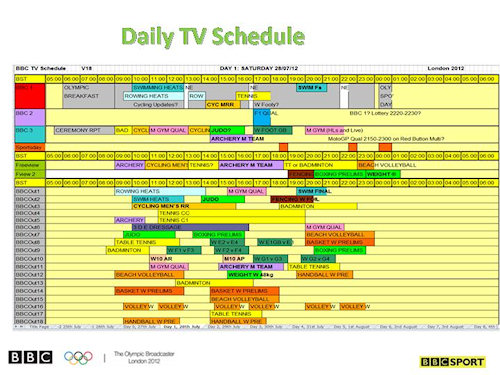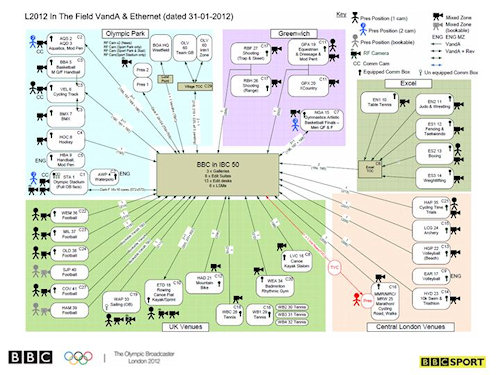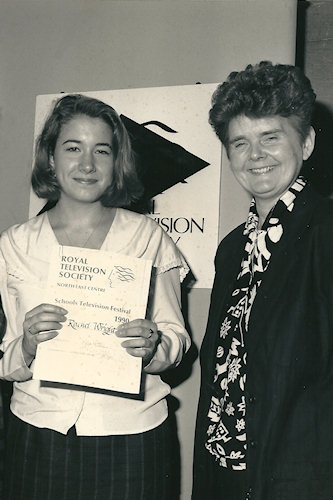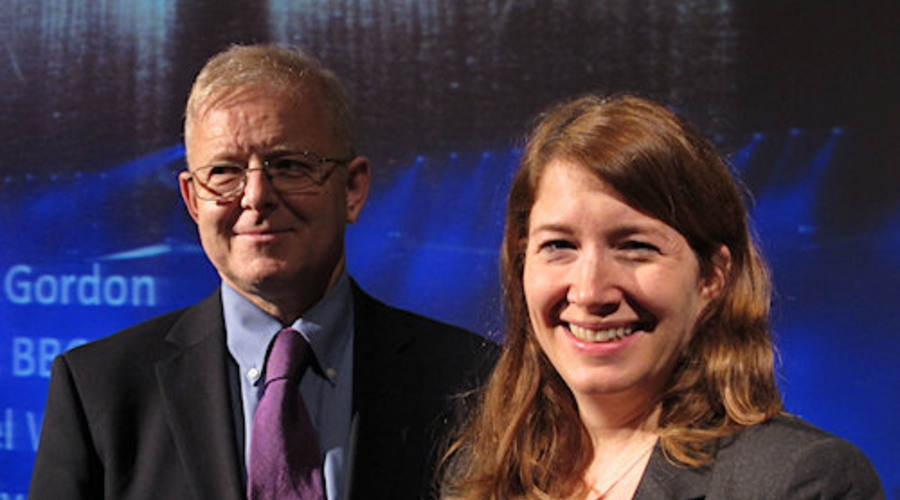No matter how great our enthusiasm and best endeavours, none of us saw ALL the London 2012 coverage — so this RTS presentation by two key BBC insiders gave a wonderful opportunity to take an overview (as well as enjoy once more the highlights).
Dave Gordon (Head of Major Events, involved in the last ten summer Games) and Rachel Wright (Production Executive, Sport Major Events) provided a superbly-prepared fascinating insight into the astonishingly complex Olympics coverage operation, as well as generously sharing their personal highs and lows.
The Firsts were dizzying — live at every venue, with every event available live; 24 simultaneous HD streams; access via the red button, online and app; plus a considerable 3D offering.
And the BBC output achieved what can look like a paradox — far greater audience fragmentation AND record levels of shared experience.
The result was a 91% reach in the UK, way above the 85% target. The shared Big Moments regularly topped 20 million. No fewer than 42% of the UK population dipped into the red button coverage. The mobile browser had 8.6 million UK users. It’s no surprise to hear that audience appreciation feedback included 81% saying the coverage was “excellent”.
So how did they do it?

Meticulous planning: the team spent seven years of focused effort to secure the best options for everything — negotiating with LOCOG on the schedule for events likely to be highlights for UK audiences, selecting the studio position with the best panorama, enforcing rigorous value-for-money tests on all elements of coverage.
Taking a holistic view of ALL audience perceptions: sports output was planned within a wider matrix of different genres of preview material (favourites included the Torch Relay, every minute covered live from a converted horsebox, and the comedy Twenty Twelve); news coverage involved all 40+ local radio stations and TV nations and regions.

Crucially, embracing the technical possibilities: former BBC Director-General John Birt was credited with the vision (and unpopular determination) to drive the BBC through the radical change which ensured it was more than ready to seize this splendid opportunity to show that the BBC has a central role in the digital age.
Providing a trusted guide to audiences: helping the individual viewer navigate the options so that they found so much choice a pleasure rather than confusing.
As ever, a measure of the success of some of the behind-the-scenes work was that we had no awareness of it at all — the contingency planning included backup plans for reliance on other hubs and OBs. The busy fibre network of material transfers included for the first time a major role for Salford, as the interactive centre which handled all logging and tagging.
The legacy included the chance to test what works best for audiences. The super hi-vis camera (with 16 times the quality of HD) was felt by Dave to be one of the greatest successes, allowing those glorious slow motion moments. The audience response to 3D was still being worked through but was more mixed — the jarring intercut between wides and close ups could distract from the viewer being absorbed in the live event. The use of GPS on road races was another advance, as was the Interactive Sport Player developed by the Future Media team.
Within the broadcaster, a legacy was a renewed confidence in the quality of the technical and creative teams. Dave admitted that it wasn’t until well into the event that confidence levels rose — he regretted the concerns (post-Pageant) that initially reduced the pleasure and satisfaction that were deserved.
The audience of nearly 150 people had many questions and observations. Most debatable was the tension between ‘cheerleading’ and objective journalism; some also queried whether the rosy glow of response was more influenced by the success of Team GB rather than the quality of output. How would Rio ‘follow that?’ — it’ll be a whole new chapter, for audiences, for athletes and for the BBC.
The event, produced and hosted by RTS committee member Tony Edwards at Newcastle’s Royal Grammar School Performing Arts Centre, was yet another highlight to add to a memorable Olympic year.
OLWYN HOCKING

** Rachel Wright first featured in the RTS North East & The Border Centre’s events more than 20 years earlier as a finalist in the annual showcase event for Young Film Makers. She has been an RTS member since the age of 14, and the Centre’s members have been delighted to chart her career progress.
Here she receives her certificate from Sheila Graber in 1990.

